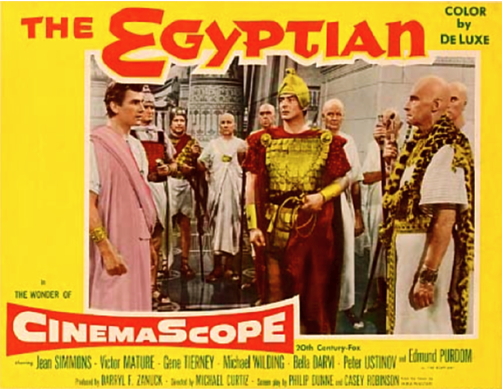
Some thoughts by Paul Zahl (of The Zahl File) on Jack Kerouac and his connection to Michael Curtiz's costume epic The Egyptian. Huh? Read on:
The 1954 Hollywood movie The Egyptian, a big picture, with Jean Simmons
and Michael Wilding, among many others, is hard to find — all but impossible
to find, in fact, until the days of Internet magic. (It's available on a Korean DVD.) It was produced by
Darryl F. Zanuck and directed by Michael Curtiz. Curtiz had directed
several big pictures, including Casablanca and Mildred Pierce, not to
mention The Walking Dead and Mystery of the Wax Museum.
The Egyptian tells the story of a young doctor in Ancient Egypt —
meaning Thebes, Memphis, and Luxor — who is ensnared pitifully by a
temptress known as the “Woman of Babylon”, completely loses his
self-respect, together with everything he owns as well as his post as
Physician to Pharaoh, and finally recreates himself as a
healer wandering throughout the Ancient World. He prospers, only to return home
to lose his true and loyal love, played by Jean Simmons, and to become
caught up in the failed but sublime One God movement of the Pharaoh
Akhenaten. In a touching scene that works dramatically and
cinematically, Sinuhe, the doctor, is converted to monotheism. After
all his sad experience of life, Sinuhe seeks monastic solitude in the
desert, a sadder man but much wiser.
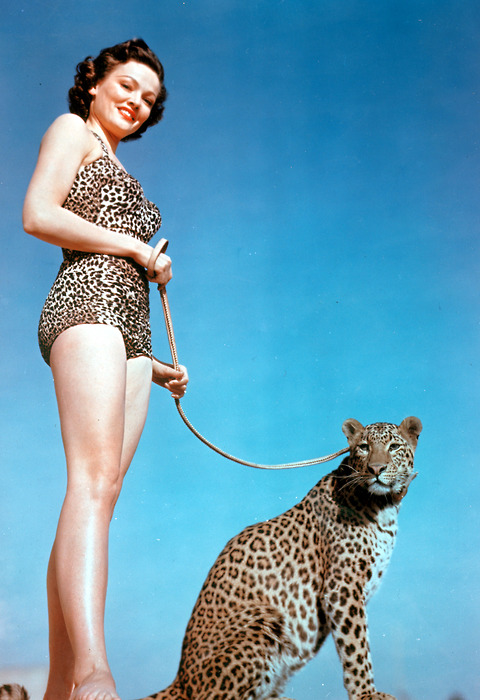
The Egyptian is pretty good. The sets are gorgeous, the camera is
fluid and assured, the acting (with the exception of Gene Tierney, who
is miscast as Pharaoh's sister) confident if a little wooden, and the
matte paintings and miniatures convincing. Personally, I like the
religion of the film, with Akhenaten's confession of his universal faith
going down well, with pathos, at the end. Some might say that The
Egyptian is suffused with '50s-style religion in this country, but that
would be unfair. The film is so anchored in the pessimistic views —
i.e., life as an exercise in dreamy futility, with loss — of the
author of the original best-selling book, that Akhenaten's “witness” in
the last scene but one, comes off as credible, and for me even
hopeful. The novel on which The Egyptian is based, incidentally, was
written in the Finnish language by Mika Waltari. In the days of our
fathers and mothers, Waltari's novel was an international sensation.
Waltari's father, incidentally, was a Finnish Lutheran pastor. It was the Finnish Lutherans, of course, who brought us The Flying Saucer Of Love.
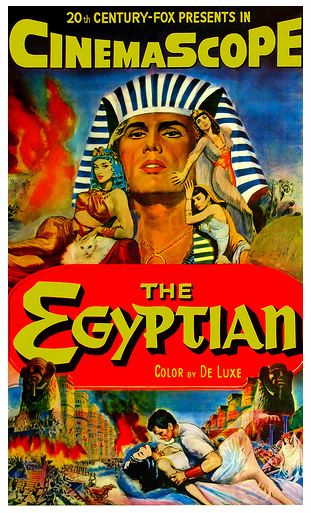
Here's the thing:
Jack Kerouac saw The Egyptian in a movie theater when it first came out.
He hated it!
The vehemence of Kerouac's response to this relatively standard
Hollywood production is surprising. I read his armchair review, which occurs in Some of the Dharma (page
124), three years ago and was impressed by his very negative reaction. Here is what he wrote:
WITH 'THE EGYPTIAN' Darryl Zanuck has purveyed a teaching of
viciousness and cruelty. They present him with a gold cup at banquets for this. The
author, Mika Waltari, is also guilty of the same teaching of viciousness and
cruelty. You see a scene of a man choking a woman under water. Both these men
are rich as a consequence of the world's infatuation with the forbidden murder,
— its daydreams of maniacal revenge by means of killing and Lust. Men kill
and women lust for men. Men die and women lust for men. Men, think in solitude;
learn how to live off your sowings of seed in the ground. Or work 2 weeks a
year and live in the hermitage the rest of the year, procuring your basic foods
at markets, and as your your garden grows work less, till you've learned to live
off your garden alone.
QUIETNESS AND REST THE ONLY ESCAPE.
The secret is in the desert.
Now, Ain't that Peculiar! The Egyptian tells the story of a man
disillusioned by romantic love — in the first half he loses his whole
self, his deepest self, to the wily and nefarious siren of Babylon.
The Egyptian envisions his then turning aside from the world, and
becoming a kind of medical “gentleman of the road”, a Sal Paradise of
the ancient Mediterranean. With Kerouacian pessimism, Sinuhe observes
the fruitlessness of human endeavor, and does so over and over again.
Finally, back home in Thebes — I love writing those words — he
becomes enlightened by Akhenaten, the Sun (One) worshiper, who reveals
to him that God is the whole of Reality, and that Forgiveness, of all
things, is at the core of that Reality. There is something like
pantheism here, together with absolving Christianity, and the the name
“Jesus Christ” is invoked on the end-title. How could Kerouac not have
responded positively to this, given his Christo-Buddhism, or
Buddhist-Christianity, or however you want to call his personal
synthesis?
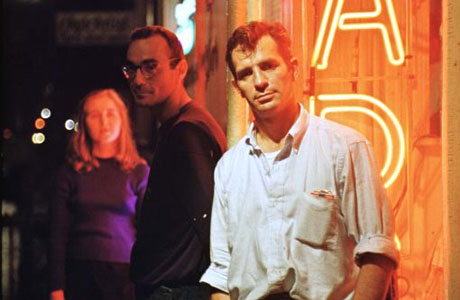
But he didn't like the film. He focused completely on the Woman of
Babylon sequence, with its subtle, slightly-off-frame drowning of the
Siren — she survives — and the “lust of the eye” and lust of the body
which drives the story at that point. Biographers of Jack Kerouac
would probably observe in these comments his suspicion of entrapping
women and entrapped men, his frequent equation of greed and lust, and
his persistent failed efforts to choose celibacy on Buddhist grounds
— “Men . . . learn how to live off your sowings of seed in the ground [my emphasis].”
I want to guess that Kerouac got stuck on the performance by Bella
Darvi as Nefer, the Woman of Babylon, and did not consider the enduring
Treue of Jean Simmons' character, nor the emphatic world-renunciation
by Sinuhe, which begins and ends The Egyptian.
What his impassioned observations do tell us, and they read as sober
and non-Benzedrined, is that Kerouac was touchy about violence. This
is the man who would brawl in bars, mad-drunk, and then write
remorseful exhortations to the whole world to Be Kind. He was also a
man who loved women, but suspected them, and their “designs”, through
and through, with the exception of Gabrielle, his mother.
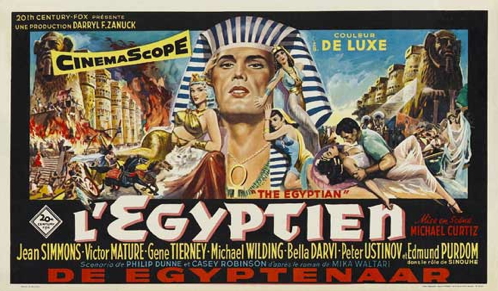
Take a look at The Egyptian. It's a good movie. Sure, it's too long.
And to be sure, there's not one word of humor. But the liturgical
scenes, with their ethereal religious chants praising “Beauty” (I
thought I could hear Lionel Ritchie's “You are so Beautiful”) — which
work! — and especially the obeisances, including Jean Simmons's, on the
steps of the temple of the One (Sun) God, are sincerely reverent, and
affecting.
You could compare the scene of Pharaoh's archers breaking into the
Temple of Aten with the Roman breach of the Temple in Nicholas Ray's
The King of Kings. The latter is bloody and sensationalistic (like the “Civil War” cards little boys loved in the '60s, by the same people who
did the “Mars Attacks” cards) — the former, sympathetic and pitiful.
My irony for today is this:
Jack Kerouac should have liked The Egyptian. The title character, take
away the toga, is the man himself.
Maybe he walked out before the end. The editor of this blog taught me never to
do that.
